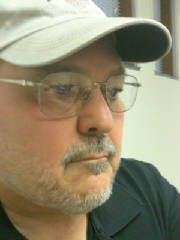I was connected
in a unique way to my grandfather on my mother’s side. His name was Don Earon (pronounced like “Aaron”),
but he was known as “Pop” within our family. He was born on January 31, 1895. I was born on his 52nd birthday and named for him.
Pop was a hardy, uncomplaining soul. As I grew up
he was a link to a way of life that had by then all but disappeared. He was raised on a mountainside farm along the West Branch
of the Susquehanna River, the youngest of three brothers and four sisters. They ate what they grew or raised, drew water from
a spring, heated it on a stove, and were warmed by the wood they chopped. My grandfather, his brothers, and his father hunted
and fished for the table as well as for the enjoyment of being in the woods.
To get a sense of the span of generations, I remind
myself that my grandfather was born in the same century in which Jefferson died. Pop was the great-grandson of Christian Earon,
who came from Württemberg, Germany, and settled on the farm in 1825—after seeing the world as a sailor. The original
parchment deed to the land on which the farm sat bears the signature of Benjamin Franklin.
Pop was born in a time when
horse-drawn wagons were still the accepted mode of travel. There were no airplanes. There was no penicillin or life-saving
medicines we take for granted. The idea of radio was just emerging. The first motion picture had just been shown. The great
San Francisco earthquake happened when he was 11.
Pop left home for the first
time when he went to France to fight with the 28th Division in World
War I. He gazed at the white cliffs of Dover as he set off across the English Channel. He got lost in the Metro in Paris.
At the front he fought with a machine gun battalion and slept in graveyards between battles. He was felled by a German mustard
gas attack and bore the burn scars on his legs for the rest of his life.
After the war he became a small cog in
one of the great business enterprises of the time: He was a locomotive engineer for the Pennsylvania Railroad, mostly during
the steam era. It was an occupation I romanticized as a small boy, but one he regarded as hard, dirty work. He said he was
glad to be done with it when he retired at 65.
He had a quiet but sure sense of what mattered in life and never shied from doing
whatever needed to be done. Once, in the immediate aftermath of the dreadful flood of 1936, a winter flood caused by backed-up
ice, the rail line that normally would have taken him back home was knocked out and he walked more than 25 miles carrying
a loaf of bread to make sure his family was taken care of.
We hunted and fished together until the effort got to be too much
for him and I went off to start my own life. Once I saw him aim with an open sight across a mountain hollow and bring down
a buck on the other slope with a single, sure rifle shot. I can’t count the times he yanked a trout from a pool in a
stream where moments before I couldn’t get a nibble.
He had a usually hidden sense of humor, but occasionally he would
throw out made-up nonsense words. “Why, that’s obsquabnoxious,” he might say with mock seriousness. If he
wanted to feign excitement he would exclaim, “Yay, Brumbaugh!” Years later I figured out he was mimicking a rally
cry from a 1915 Pennsylvania political campaign.
In the years since he died—in 1993, at age 98, uncomplaining to the end despite
a list of infirmities—I have observed our shared birthday by wearing, on that day, the ring that he always wore, a ring
he’d had made long ago to display a small brooch cameo that had belonged to his mother.
This year on January 31, while
wearing Pop’s ring, I received the news that my grandson, Gabriel Earon Caruge, had arrived to share the birth date
with us, thus rooting our beginnings in three separate centuries.
Jean-Michel Caruge, my son-in-law and Gabriel’s father, is
French. Thanks to Jean-Michel and my daughter, Dana, that young American from the farm who went to France to fight nearly
100 years ago has received the gift of another descendant carrying his name. Once again life has circled around.
Copyright
2014 Editorial Enterprises, Inc., and Donald C. Sarvey


